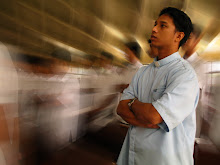A Greater Monument than a Cathedral
When the defendant’s lawyer Henry Drummond was asked if he finds anything holy, he replied:
“Yes. The individual human mind. In a child's power to master the multiplication table, there is more sanctity than in all your shouted "amens" and "holy holies" and "hosannas." An idea is a greater monument than a cathedral. And the advance of man's knowledge is a greater miracle than all the sticks turned to snakes or the parting of the waters.”
In this particular scene, Drummond strives to demonstrate the power of the human mind. For him, the human intellect has the power to advance humankind, while religion, as implied by the film, stifles human inquiries. This fact speaks of the main conflict of the film: Creationism as against Darwinism.
Yet, while and after watching the film, I felt a little disturbed on the whole packaging of the film. While presenting the tension between these two thoughts, I sensed certain biases or prejudices in the film. I’m not really sure whether the film has faithfully presented the factual, accurate and historical events on which it is based. Somehow I feel that there is a biased inclination for those who upheld creationism. Christians, particularly Matthew Brady, are lampooned and portrayed in parody, while skeptics and agnostics and those who upheld Darwinism are portrayed as intelligent, kind, and even heroic. This bias slant arrived to me so vividly as I evaluate the film in its entirety.
Nevertheless, the main point of the film is manifestively meritorious in the exaltation of the human intellect. It presents a clear message that human beings are special among other earthly creatures as they are endowed with the capacity to think. I was so struck with the following dialogue from the courtroom drama of the film:
Matthew Harrison Brady: We must not abandon faith! Faith is the most important thing!
Henry Drummond: Then why did God plague us with the capacity to think? Mr. Brady, why do you deny the one thing that sets above the other animals? What other merit have we? The elephant is larger, the horse stronger and swifter, the butterfly more beautiful, the mosquito more prolific, even the sponge is more durable. Or does a sponge think?
Matthew Harrison Brady: I don't know. I'm a man, not a sponge!
Henry Drummond: Do you think a sponge thinks?
Matthew Harrison Brady: If the Lord wishes a sponge to think, it thinks!
Henry Drummond: Does a man have the same privilege as a sponge?
Matthew Harrison Brady: Of course!
Henry Drummond: [Gesturing towards the defendant, Bertram
Cates] Then this man wishes to have the
privilege of a sponge, he wishes to think!
The film thus evidently suggests that faith and science are in constant struggle with each other. And this has never been a unique case. It has always been a blown-up issue at which the Church as an institution is presented as a narrow-minded authority. But this is because the line of demarcation is not well-defined. There are responses which advocate that faith and reason are of different realm, thus saying that it will never meet. Others would point out that the progress of the human knowledge and sciences is in the service of faith. St. Anselm in the Medieval Times have synthesized the seeming conflict of the two: Faith seeking understanding. Our late Pope John Paul II in his encyclical letter Fides et Ratio presented these two in harmonious relationship and service to one another. Even during the contemporary times, some priests sought to see the connection and harmonious meeting of faith and science with the likes of Teilhard de Chardin. On the other hand, our scientists today, employing the most sophisticated technology and advancement of sciences, even admit the limitations of the human mind in so saying that there is still something beyond out there.
We are endowed with the capacity to think, to reflect, to seek answers. Progress of the human knowledge and sciences, in the end, will eventually lead us to the Ultimate. God granted us this gift. It is the best gift He could ever think of for his greatest creature. Such a gift cannot be a threat. No gift from God could ever be used against Him. There is no tension actually. The human intellect will all the more confirm the greatness and the goodness of God.
What is that greater monument than a cathedral? It is the human person, endowed with the gift to think. It is, in fact, the thinking human persons that make up the Church.




